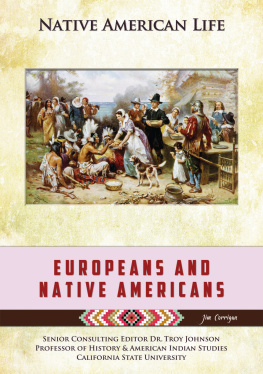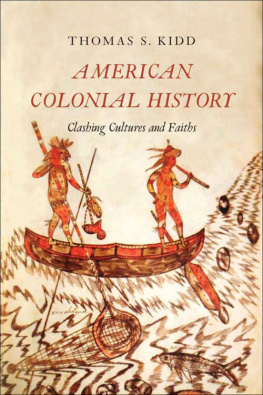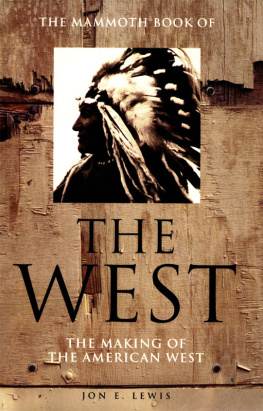The American West
The Lamar Series in Western History
The Lamar Series in Western History includes scholarly books of general public interest that enhance the understanding of human affairs in the American West and contribute to a wider under standing of the Wests significance in the political, social, and cultural life of America. Comprising works of the highest quality, the series aims to increase the range and vitality of Western American history, focusing on frontier places and people, Indian and ethnic communities, the urban West and the environment, and the art and illustrated history of the American West.
Editorial Board
Howard R. Lamar, Sterling Professor of History Emeritus, Past President of Yale University
William J. Cronon, University of WisconsinMadison
Philip J. Deloria, University of Michigan
John Mack Faragher, Yale University
Jay Gitlin, Yale University
George A. Miles, Beinecke Library, Yale University
Martha A. Sandweiss, Princeton University
Virginia J. Scharff, University of New Mexico
Robert M. Utley, Former Chief Historian, National Park Service
Recent Titles
Sovereignty for Survival: American Energy Development and Indian Self-Determination, by James Robert Allison III
George I. Snchez: The Long Fight for Mexican American Integration, by Carlos K. Blanton
Growing Up with the Country: Family, Race, and Nation After the Civil War by Kendra Taira Field
Grounds for Dreaming: Mexican Americans, Mexican Immigrants, and the California Farmworker Movement, by Lori A. Flores
The Yaquis and the Empire: Violence, Spanish Imperial Power, and Native Resilience in Colonial Mexico, by Raphael Brewster Folsom
Subverting Exclusion: Transpacific Encounters with Race, Caste, and Borders, 18851928, by Andrea Geiger
The American West: A New Interpretive History, Second Edition, by Robert V. Hine, John Mack Faragher, and Jon T. Coleman
Legal Codes and Talking Trees: Indigenous Womens Sovereignty in the Sonoran and Puget Sound Borderlands, 18541946, by Katrina Jagodinsky
Gathering Together: The Shawnee People through Diaspora and Nationhood, 16001870, by Sami Lakomki
An American Genocide: The United States and the California Indian Catastrophe, 18461873, by Benjamin Madley
Home Rule: Households, Manhood, and National Expansion on the Eighteenth-Century Kentucky Frontier, by Honor Sachs
The Cherokee Diaspora: An Indigenous History of Migration, Resettlement, and Identity, by Gregory D. Smithers
Wanted: The Outlaw Lives of Billy the Kid and Ned Kelly, by Robert M. Utley
First Impressions: A Readers Journey to Iconic Places of the American Southwest, by David J. Weber and William deBuys
Forthcoming Titles
White Fox and Icy Seas in the Western Arctic: The Fur Trade, Adaptation, and Rapid Change in the Early Twentieth Century, by John R. Bockstoce
The American West
A NEW INTERPRETIVE HISTORY
SECOND EDITION
Robert V. Hine, John Mack Faragher, and Jon T. Coleman
Yale UNIVERSITY PRESS
New Haven and London
Published with assistance from the Joan Patterson Kerr Fund and from the income of the Frederick John Kingsbury Memorial Fund.
First edition 2000. Second edition 2017.
Copyright 2000, 2017 by Yale University.
All rights reserved.
This book may not be reproduced, in whole or in part, including illustrations, in any form (beyond that copying permitted by Sections 107 and 108 of the U.S. Copyright Law and except by reviewers for the public press), without written permission from the publishers.
Yale University Press books may be purchased in quantity for educational, business, or promotional use. For information, please e-mail (U.K. office).
Set in Minion and Egiziano types by Newgen North America.
Printed in the United States of America.
Library of Congress Control Number: 2016960137
ISBN 978-0-300-18517-1 (paperbound : alk. paper)
A catalogue record for this book is available from the British Library.
This paper meets the requirements of ANSI/NISO Z39.48-1992 (Permanence of Paper).
10 9 8 7 6 5 4 3 2 1
FOR BOB AND SHIRLEY HINE
Contents
Preface to the Second Edition: The Re-Boot
The skeletal remains of an industrial city scroll across the windshield of a cruising automobile. Empty highway off-ramps loop overhead while roadside factories spew filth into pallid skies. A guitar strums the opening chords of Eminems Lose Yourself, and day blinks to night. A tough voice hails Chryslers 200, a ridiculously high-end four-door sedan that somehow captures the spirit of hideously lowdown Detroit.
Detroit molders on the fringes of the United States. Parked next to Canada, the city teeters on a geopolitical drop-off. Detroits actual location, however, meant little to the advertising professionals that chose the city and Eminem to star in their 2011 Super Bowl commercial. Only the ugly weather suggested a true global position. No, the ad makers came to Eminem and Detroit for their exquisite down-and-out-there-ness. Both were damaged icons. Kneecapped by the auto industrys overreliance on truck and SUV sales, hollowed out by thousands of laid-off workers escaping for sunnier climes, and set aflame by the 20089 financial meltdown, the city proffered Hollywood its ashes. The rapper knew hard times as well. An addict with a taste for pills, he spent the 2000s coming to terms with the success he achieved the previous decade. The titles of his last three albumsEncore, Relapse, and Recoveryhinted at his troubles.
Detroits status as a car-wrecked municipality and Eminems reputation as a flawed human being make them the ideal opening act for a revised edition of The American West: A New Interpretive History. While nowhere near as obsolete as the U.S. auto industry, The American West is due for an overhaul. More than a decade has passed since its last refurbishing. A lot has happened: terror attacks and security crackdowns, wars-of-choice and drone campaigns, economic downturns and taxpayer bailouts, tea parties and occupied parks. The planet has continued to heat up while information has flowed in ever quickening streams to manifold devices. The world has turned since 2000, so too has the history of the American West. A new generation of scholars, inspired by an energetic group of (now) senior citizens, the New Western historians of the 1980s and 1990s and their critics, has come into their own and filled bookshelves with new research and interpretations.
The rush of work, for all its intelligence and well-deserved accolades, seems timid and scattered when compared to the vintage stuff. The New Western history organized debates around a set of pressure points: region versus frontier; place versus process; progress versus decline. Was the West a distinctive locale, defined by its aridity, its mountainous terrain, or its proximity to the Pacific Ocean, or was it a set of colonial relationships and power struggles that rippled across many landscapes throughout the continent? Did borders and boundaries in time and space define the place and its history or did line-crossing economies, migrant groups, and nation-states explain the past better? Was this history bright and hopeful or criminal and tragic? Scholars picked sides (sometimes in opposition, sometimes at right-angles, many times in parallelthere was a good deal of talking past one another in the 1980s and 1990s) and threw down in public. The ruckus has since died down, and the scrum parted, not so much in peace as indecision. Most western historians have agreed to agree. Western history deals with most everything now: place and process, region and frontier, men and women, whites and racial minorities, queers and heteronormatives, humanity and nature; the good, the bad, and the ambiguousespecially the ambiguous.
Next page




